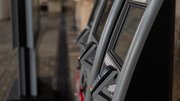Article
Diebold has Georgia on its Mind in Election
If you think politicians have a lot riding on Tuesday's election, consider the opportunity for Diebold. The manufacturer's touchscreen voting machines will be used for the first time in a statewide race.
October 31, 2002
To all you chads hanging around out there: Your days are numbered.
When Americans go to the polls Nov. 5, most voters will be casting their ballots using the same antiquated methods they used in 2000. But in Georgia, where 94,000 votes went uncounted two years ago due to equipment failures, the state's 3.7 million registered voters will use touchscreen machines for the first time.
That makes some state officials nervous, as well as U.S. Sen. Max Cleland and his Republican challenger Saxby Chambliss, the two candidates for a Georgia U.S. Senate seat. The stakes may be highest, though, for Diebold Elections Systems, which supplied the state with 19,015 new touchscreen voting machines after beating out eight rival suppliers for the winning contract.
Georgia's secretary of state, Cathy Cox, pushed through a $54 million initiative to overhaul the state's voting system. For Diebold, known primarily as a manufacturer of ATMs, the election is a major test that could help boost its chances of taking a leading role nationally in a highly competitive field. Of course, an election day snafu involving the machines would be an equally debilitating setback.
Big Money Coming
When President Bush signed legislation overhauling the nation's voting system Oct. 28, it assured Diebold and other manufacturers that state governments will be in the market for voting equipment during the next three years. The Help America Vote Act includes $3.9 billion in federal money to help the states to throw out outmoded punch-card and lever voter machines in favor of better, more efficient systems. By "more efficient" read: Electronic systems.
But the bill came too late for jurisdictions to implement new programs for this year's election. Georgia began planning its changes nearly two years ago, and last November ran a pilot project using six different brands of electronic systems in municipal elections, according to the New York Times. A 12-member committee chose Diebold's system after considering bids from nine different suppliers.
Diebold, based in North Canton, Ohio, got its start in the voting machine industry when it deployed 355,000 electronic voting terminals in Brazil between 1998 and 2000. The units being used in Georgia are called the Accuvote TS system. Many expect the machines, and others like them, to revolutionize an American voting system whose flaws were exposed nationally in the 2000 presidential race between George W. Bush and Al Gore.
There's mounting evidence that punch cards, lever machines and pencil and paper are quickly falling from favor in the nation's election industry. Election Data Services Inc., a Washington-based consulting firm, estimates that nearly 20 percent of U.S. voters will use electronic touchscreen voting terminals this year. That's up markedly from the 12 percent in 2000.
 |
A voter uses Diebold's voting machine. |
However, there's still a long way to go, said Dan A. Gwadosky, secretary of state in Maine and president of the National Association of Secretaries of State. He told the New York Times, "Very little has been done in the last two years. There's probably a greater danger in this November election of people being disenfranchised because of the lack of upgrades in equipment and the lack of effective training than there is of outright election fraud."
Georgia is the first state in the nation to implement a uniform statewide computerized touchscreen voting system. And thanks to the Help America Vote Act, Diebold is positioned to take advantage of millions more in federal money.
Opportunity Knocking
"There's a good opportunity for the right company, but you have to be a proven performer in this business," said Mark Radke, director of voting industry for Diebold.
Diebold has been involved in a number of pilot projects for its touchscreen voting terminals around the nation, including tests in Maryland and California. In the latter state, it developed terminals that walk voters through ballots in English, Spanish and Chinese.
"There's a good opportunity for the right company, but you have to be a proven performer in this business." Mark Radke, Diebold |
Voters found using these terminals was extremely easy, much like mastering an ATM or microwave oven, said Chris Riggall, press secretary of the Georgia Secretary of State's office. Riggall said the terminals come equipped with large, easy-to-read type and walk the voter through the process. Just before the votes are cast, the terminals give the voter a summary of choices in various races. They also tell whether a voter has failed to cast a ballot in a particular race.
"We believe we've got it right," said Riggall, whose office oversees elections in his state. "Voters to an amazing degree love the electronic voting."
In Georgia, Riggall said, Diebold is supplying a "turnkey" operation. The company has worked with the Secretary of State to educate voters about the new system and to train poll workers on how to use the new technology. "We have Windows-based software that is very learnable," Riggall said. Under terms of the contract, Diebold will provide technical support to Georgia through the presidential election in 2004.
Radke said Diebold stepped up its commitment to electronic voting systems following the election debacle in Florida in 2000. In January of this year, the company paid $40 million to acquire Global Election Systems Inc. of McKinney, Tex. During the quarter ended Sept. 30, Diebold reported revenues from its voting systems products of $55 million. That's a drop in the bucket for a $2 billion company, but Radke sees strong growth in the sector.
He cited California's passage of Proposition 41 to spend $200 million to replace its antiquated punch-card voting system with something more modern. Also, New York State plans to spend $60 million in a move toward touchscreen terminals.
And with the $3.9 billion available from the federal government for states' use in modernizing voting equipment, there's certainly going to be a number of state governments in the market for new voting equipment.
Said Riggall: "We are moving away from gas lights and horses and buggies in our voting system."
 ChatGPT
ChatGPT Grok
Grok Perplexity
Perplexity Claude
Claude









